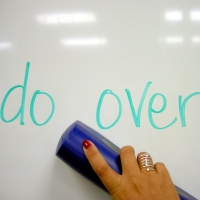Recover from Mistakes and Save Face—as Well as Your Job

Out of curiosity, I looked up synonyms for mistake. They include blunder, blooper, inaccuracy, lapse, error, fault, defect, slip-up, gaffe, miscommunication, misstep, oversight, mix-up, flaw, goof, whopper, and doozie. No doubt you can add a few more. When it comes to screwing up, doing wrong, and making a mess of things, there’s no limit to the words used to characterize it.
It’s not easy to recover from major mistakes such as incorrectly rerouting network traffic and causing a nearly twenty-four hour outage on a much-used website. One way to deal with a mistake you’ve made is to crawl into bed and stay there indefinitely to avoid making any further mistakes. That, however, might put a dent in the rest of your life.
As bad as a mistake might be, it’s what happens next that matters. With a little self-confidence and courage (or, in some cases, heaping doses of each), you can move past the mistake and learn from it.
A wise approach is to be proactive so you can get past the mistake as quickly as possible. Some good steps toward getting back on track are to recover, refocus, and retry. The recovery step entails regaining your composure and avoiding sliding into a deep emotional hole. Then, refocus on what needs to happen next. Finally, retry, whether that entails redoing what led to the mistake to begin with or attempting an altogether different approach. Of course, all of this is easier said than done, so these steps take practice. Fortunately, most of us make enough mistakes to get lots of practice.
In general, when you make a mistake, take some action immediately, including notifying appropriate parties. Admit fault and resist the temptation to blame others. Create a plan of action to fix the mistake. Then—and only then—figure out why you made the mistake. I’ve seen people fall into the trap of analyzing what caused a mistake while the chaos resulting from the mistake was still erupting all around them. Don’t do that. First, get things under control. Then, figure out how to avoid a recurrence.
At the same time, be prepared for repercussions. If the mistake was a biggie—to those affected, even if not to you—apologizing and fixing the mistake as best you can may be insufficient. You might have to pay a price. Regardless, try to go easy on yourself. To make mistakes is to be human. Knowing that may not make you feel any better, but chances are you will survive. If you can learn from the experience, you’ll be better prepared to handle the next mistake. Because there will be a next time.

